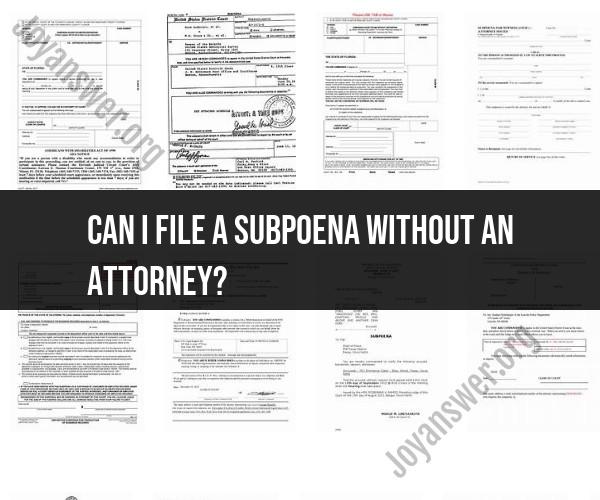Can I file a subpoena without an attorney?
Filing a subpoena without an attorney can be a complex process, and it's important to note that the specific steps and requirements can vary by jurisdiction and the type of subpoena you need to file. However, I can provide you with a comprehensive overview of the general steps involved in filing a subpoena pro se (representing yourself) in a civil case. Please consult your local rules and regulations or seek legal advice for jurisdiction-specific guidance.
1. Determine the Type of Subpoena:
- Subpoenas can be used to compel the production of documents, the attendance of a witness for a deposition or trial, or both (duces tecum or subpoena ad testificandum).
2. Identify the Relevant Court:
- Determine the court in which your case is pending. This could be a federal court, state court, or administrative agency, depending on your legal matter.
3. Draft the Subpoena:
- Create a subpoena document that includes:
- The caption of the case (identifying the court and parties).
- The specific information or documents you are seeking.
- The name of the person or entity being subpoenaed.
- A clear date, time, and location for any required deposition or appearance.
- Your contact information.
- Any applicable fees for compliance and witness fees.
- Some courts may provide subpoena forms or templates that you can use as a reference.
4. Check Local Rules:
- Review the local rules of the court where your case is pending. These rules will provide guidance on the procedure for filing subpoenas, including any required forms, filing fees, and timelines.
5. File the Subpoena:
- Typically, you'll need to file the subpoena with the court clerk in the same jurisdiction where your case is pending. You may need to provide multiple copies of the subpoena.
- Pay any required filing fees, if applicable. In some cases, you may be able to request a waiver of fees if you can demonstrate financial hardship.
6. Serve the Subpoena:
- After filing, you must serve the subpoena on the person or entity being subpoenaed. Service methods can include personal service, certified mail with a return receipt, or other methods as specified by local rules.
- Ensure that you comply with the specific rules regarding service in your jurisdiction.
7. Notify Other Parties:
- Notify all other parties in the case that you have issued a subpoena. They have the right to object to it or request a protective order.
8. Comply with Deposition Rules:
- If the subpoena requires a deposition, follow the rules for conducting depositions, including recording the testimony, providing notice, and respecting deposition limits.
9. Respond to Objections:
- If the person or entity being subpoenaed objects to the subpoena, you may need to address those objections through motion practice or negotiation.
10. Attend Court Hearings:- Be prepared to attend court hearings or proceedings related to the subpoena if required.
11. Follow Up:- Ensure that the person or entity being subpoenaed complies with the subpoena. If they do not, you may need to seek enforcement through the court.
It's important to understand that the legal process can be complex, and errors or omissions in filing a subpoena can have significant consequences. If you are not comfortable representing yourself or encounter difficulties during the process, it may be advisable to seek legal counsel or assistance to ensure that your rights and interests are properly protected.













